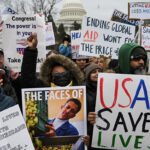Tuesday, April 8, 2025
Year : 2, Issue: 32
Anadolu Agency: Global markets are reeling from US President Donald Trump’s sweeping new tariffs, the latest escalation in a trade strategy he defends as a cure for America’s chronic trade deficit. But economists and financial institutions are issuing urgent warnings that the fallout may be far more damaging than the disease.
“These tariffs are every bit as high as the notorious Smoot-Hawley Tariff of 1930,” said Barry Eichengreen, a leading economic historian at the University of California, Berkeley, referring to a policy widely blamed for worsening the Great Depression. “The negative reaction of financial markets says it all. Recession probabilities have gone up significantly, most of all for the United States but (also) globally.”
The Smoot-Hawley Tariff was named after two US politicians, Senator Reed Smoot and Representative Willis C. Hawley, who sponsored the legislation. Passed in 1930, it raised tariffs on over 20,000 imported goods in a bid to protect American farmers and industries during the Great Depression.
While the intent was to protect domestic jobs and industries from foreign competition, they created an economic shockwave of global proportions. Many of the countries affected hit back with retaliatory tariffs on US goods, delivering a severe blow to international trade, as well as domestic production and consumption. The impact would linger until World War II.
At a news conference on Monday, Trump stood firm, describing the tariffs, which slap a minimum 10% duty on all imported inputs and final goods, as “medicine” to treat what he calls unfair trade practices.
While Trump has championed tariffs since first term as president in 2018, some of the most powerful voices in business and finance are sounding the alarm.







